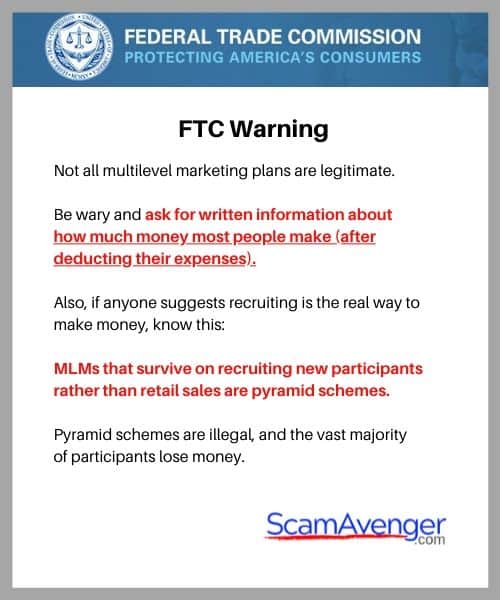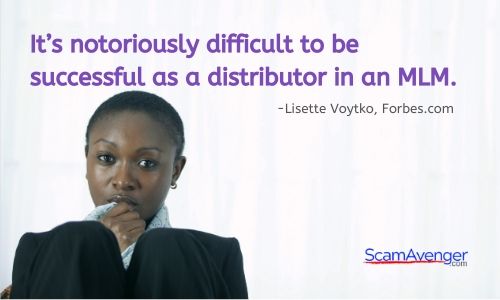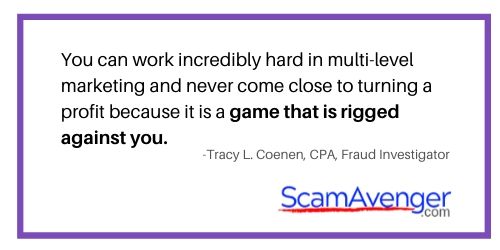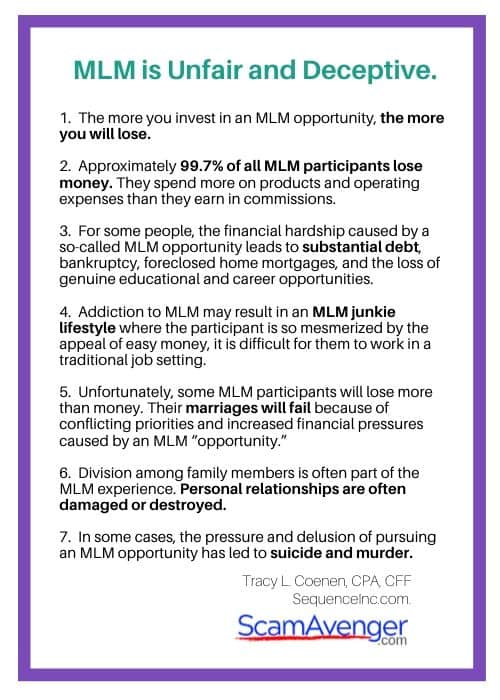Traveling Vineyard promises you can change your world as a Wine Consultant. However, is Traveling Vineyard a good opportunity or just another multi-level marketing company preying on its sales force?
Is Traveling Vineyard a good opportunity? According to the 2017 Traveling Vineyard Income Disclosure, most Traveling Vineyard Wine Consultants lose money, and very few earn a profit.
In this article, I reveal 8 secrets about Traveling Vineyard you need to know before you sign a contract with the company or risk your time, money, energy and reputation.
Is Traveling Vineyard a Good Opportunity?
Although Traveling Vineyard is a direct selling company, because it uses a multi-level compensation plan, critics of the industry would probably refer to it as a multi-level company or MLM.
In this article, I will refer to Traveling Vineyard as an MLM too.
Before the Traveling Vineyard opportunity can be properly evaluated, it is necessary to substantiate how much most Wine Guides earn and how much they spend on their business.
To find this information, we must look at the Traveling Vineyard Income Disclosure, Compensation Plan and Company Policies.
Although Traveling Vineyard does publish an Income Disclosure, the numbers are misleading.
Traveling Vineyard intentionally hides its Compensation Plan and Company Policies. Without these, the opportunity cannot be adequately evaluated.
Based on Traveling Vineyard’s lack of transparency and, after researching Traveling Vineyard and the industry, it is my opinion that Traveling Vineyard is not a good opportunity.
It’s not an opportunity at all.

The Traveling Vineyard website is careful not to overtly promise an opportunity, although it clearly implies you can make a career out promoting the company’s wines.
Because Traveling Vineyard does not openly promise an opportunity, it avoids legal and ethical requirements to disclose information needed to evaluate its opportunity.
In other words, because Traveling Vineyards does not technically promise you an opportunity, it does not have to provide information that the opportunity is real.
However, what are they offering, if not an opportunity?

Traveling Vineyard is offering you the chance to give the company your money and to recruit more people who will give the company their money too.
As ridiculous as that may seem, people fall for it because it’s sold to them as an opportunity for a career in the wine industry, to party, get free wine, fulfill their dreams or some other hot button.
Traveling Vineyard gets away with it because it is the responsibility of the individual to conduct their own thorough “due diligence” before getting involved.
This article is a thorough investigation of the Traveling Vineyard opportunity. It can serve as your due diligence. Continue reading to discover the truth about Traveling Vineyard.
Why You Can’t Win with MLM (Video).

If you don’t see the video, click Why You Can’t Win with MLM to watch it.
8 Secrets About Traveling Vineyard You Need to Know.
- 1Traveling Vineyard fails to disclose essential information about earnings, expenses, and company policy.
- 2Traveling Vineyard is an MLM, an outdated business model rigged against 99% of the players.
- 3Traveling Vineyards Wine Guides do not own a business. They are independent contractors.
- 4It’s estimated that less than 1% of Wine Guides earn a profit.
- 5Based on industry averages, most Wine Guides will lose money and quit within their first year.
- 6Some Wine Guides will incur substantial debt.
- 7Party-plan marketing is an inefficient, expensive, and labor-intensive sales model.
- 8Multi-level Marketing is in steep decline in North America as the predatory nature of the industry becomes known.

Traveling Vineyard’s Poor Reputation.
The multi-level marketing industry has a horrible reputation for selling false hope.
In the past, many MLMs would promise anyone with a pulse the opportunity to work for themselves and earn huge incomes.
These promises were nothing more than marketing tricks meant to fool people into joining and spending money.
Many lives were damaged because of it.
In recent years, the FTC and critics of the industry have pushed for MLM companies to only make such claims if they can prove their opportunity is real.
To my knowledge, no MLM can prove its opportunity is genuine.
The result of the FTC’s efforts is that many MLMs are avoiding making outlandish claims on their website, but they are still pushing the same impossible business scheme.
In my opinion, Traveling Vineyard is no different.
RepDigger.com, an online reputation tracker, gives Traveling Vineyard a reputation rating of 29%, which is terrible.
It appears that Traveling Vineyard’s awful reputation is primarily based on online complaints.

You Are the Customer.
A revealing truth about MLM is that it exploits its sales force.
This exploitation begins with charging a salesperson for the privilege of making money for the company. No other business model does this.
If you become a Wine Guide with Traveling Vineyard, you will soon discover that every interaction you have with the company will cost you money. This is not an accident.
Likewise, as you’re spending money on a starter kit and a website, Traveling Vineyard is making money at your expense.
There are two starter kits to choose from. The Success Kit for $179 and the Essential Success Kit for $99.
Both kits include the materials needed to present a wine tasting, including 10 bottles of wine. After a couple of wine tastings, you must replace the wine in the kit.
Replacement wine costs $75. However, if the previous wine tastings generated enough sales, Traveling Vineyard may credit you the cost of replacement wine.
If wine sales fall short, you lose money.
And, you’ll have to spend more of your money to get replacement wine if you want to continue as a Traveling Vineyard Wine Guide.
A Wine Guide is, first and foremost, a Traveling Vineyard customer.
How much of the company’s revenue comes from the pockets of Wine Guides? We have no way of knowing. Traveling Vineyard does not share this information.
Research into the multi-level marketing industry suggests it’s typical for MLM companies to earn most of their revenue through sales to their sales force.
Because staying in business means continually replenishing the wine in their kit, sooner or later, a Wine Guide will realize they can’t afford to continue.
A typical MLM will also increase “qualifying” demands at each level of the compensation plan. Qualifying often requires a person to spend more money on MLM products.
Thus, generating more profits for the company.
This might include enrolling in auto-ship to automatically buy wine each month.
Traveling Vineyard’s auto-ship program is called Rewined.
Because the company does not publish its Compensation Plan or Policy, we do not know the details of its auto-ship program or required minimum qualifying purchases.
The actual cost of becoming and advancing as a Wine Guide cannot be determined because Traveling Vineyard hides that information.
In other words, Traveling Vineyard makes the rules of the game but then hides the rules.
It is the nature of MLM to exploit its sales force. That’s why the business model is so lucrative for the owners of the company.
As an MLM, Traveling Vineyard is probably exploiting and profiting from its sales force too. Why else would it hide the information?

Traveling Vineyard and the FTC Warning.
When it comes to regulating MLMs, the Federal Trade Commission is in an awkward position.
is in an awkward position.
As a regulatory body subject to political control, the FTC is tasked with warning citizens about the dangers of MLMs.
At the same time, the FTC is pressured by MLM lobbying groups to allow predatory behavior.
Some influential people have connections to the MLM industry, including President Donald Trump and Secretary of Education Betsy DeVos.
Still, you can find a lot of information on the FTC website that condemns the MLM industry for misleading and exploitative practices.
Specifically, the FTC says there are two things you must know before you commit to an MLM like Traveling Vineyard.
- 1You must know if MOST Traveling Vineyard Wine Guides earn a profit after deducting expenses.
- 2You must know if Traveling Vineyard promotes recruiting as a way to make money.
Discover
Your Path to Financial Freedom!
Free Coaching & Training
Do MOST Traveling Vineyard Wine Guides Earn a Profit After Deducting Expenses?
The essential word in the above question is MOST.
Because the typical MLM company is continually taking money from its salespeople by imposing expenses, we want to know how much profit most Wine Guides earn.
Although it is misleading, the Traveling Vineyard Income Disclosure for 2017 does give us some numbers to work with, but we’ll have to massage them a bit to see the truth.
I won’t reproduce the Traveling Vineyard Income Disclosure here because it’s copyrighted.
Click on Income Disclosure to open it in a new tab and follow along.
to open it in a new tab and follow along.
With the Income Disclosure open, look across the top row for Wine Guide, and you’ll see that 72.42% of “PAID” Wine Guides earned an average of $350 for the YEAR!
Remember, that’s $350 before deducting expenses like $99 for a starter kit and $120 for a website for a year, plus the monthly cost of auto-ship, gas, and wear and tear on an automobile.
And that’s as good as it gets!
Step back and look at that percentage again. It says 72.42% of PAID Wine Guides.
Traveling Vineyard is skewing the income numbers to make them look better by only counting people who were paid commissions.
What about the Wine Guides who failed to earn anything?
Traveling Vineyard ignores them.
Before we can determine how much the average Traveling Vineyard Wine Guide earns, we must evaluate those averages based on ALL Wine Guides, winners, and losers.
In the footer beneath the Income Disclosure, we can see that in 2017 Traveling Vineyard had 5122 registered Wine Guides.
If we deduct the number of Wine Guides who earned commissions (4531) from the total number of Wine Guides (5122), we can see that 591 did not make anything at all.
If we add the 591 who did not earn anything to the 3282 who earned an average of only $350, we can see that 3873 or 76% of all Wine Guides.
Think about that. 76% of all Wine Guides earned an average of $350 or less for the YEAR before expenses are deducted.
It gets worse.
The losers clearly spent some money on their business, at least $99 for a starter kit and $120 for a year’s worth of website use.
In other words, they lost $219 for the year.
But what about other expenses like buying products on auto-ship to support their business, business cards, gas, etc.?
Traveling Vineyard does not reveal how much the average Wine Guide spends on her business. We’ll have to look to industry averages to get an idea.

In 2011, Dr. Jon Taylor, a leading critic of MLM, evaluated the top 300 MLMs in North America and concluded the average annual expense of running an MLM business was about $2,500.
Adjusted for inflation, that figure would have been $2,700 in 2017.
In other words, if we use Dr. Taylor’s estimate of expenses, the average Traveling Vineyard Wine Guide must earn at least $2,700 for the year to break even.
How many Traveling Vineyard Wine Guides failed to break even?
Most of them.
Look at the Income Disclosure, and you’ll see that only the fourth level and above earned more than $2,700 for the year. The first three levels earned considerably less than that.
When we add these levels together, we can see that 4504 Wine Guides failed to earn a profit.
In other words, 87% of all Traveling Vineyard Wine Guides failed to earn a profit.
MOST Wine Guides lost money.
Look closely at the three highest levels of the Traveling Vineyard Income Disclosure, and you’ll see that, based on averages, only 20 Wine Guides earned a full-time income.
Only 20!

The FTC’s Second Question.
The second question the Federal Trade Commission recommends we consider in our evaluation of Traveling Vineyards is;
Does it promote recruiting as a way to make money?
Because Traveling Vineyards does not publish a Compensation Plan or Company Policies, we cannot answer this question.
This secrecy is reason enough to avoid Traveling Vineyards.
Why would you want to invest your time, money, energy, and reputation in a company that does not play fair?
Looking back at the Income Disclosure, we can see that Traveling Vineyards has 11 levels.
Because Traveling Vineyard is so secretive, we can only assume that the levels above the entry-level require recruiting.
The FTC Warning Revisited.
Remember, the Federal Trade Commission’s warning challenged us to first determine if MOST Traveling Vineyard Wine Guides earned a profit.
Using the information on the Traveling Vineyard Income Disclosure, we discovered that MOST Wine Guides DO NOT earn a profit.
In fact, most Wine Guides lose money.
This is typical of MLMs because the game is rigged to make money for the company at the expense of the salespeople.
The FTC also warned us to find out if Traveling Vineyard promotes recruitment as a way to make money.
Because of Traveling Vineyard’s secrecy, we could not conclusively determine the answer to the second question.
However, the company’s secrecy is off-putting and reason enough to steer clear of Traveling Vineyard.
Considering Traveling Vineyard’s lack of transparency, it’s critical to understand the company’s unstated objective.
Once you understand this essential detail, the way Traveling Vineyard does business will make more sense.

Traveling Vineyard’s Unstated Objective.
If someone is trying to recruit you into Traveling Vineyard, or if you get excited about wine, it might be easy to fall in love with the company.
That would be a mistake.
Persuasion on any level is mostly based on emotion. To some degree, persuasion is a process of seduction.
In other words, if someone is trying to recruit you into Traveling Vineyard, they are trying to seduce you with emotion rather than logic.
When considering a business, it is essential to stay as objective as possible. Let the numbers determine if the opportunity is real or not.
And, you must also determine what the underlying agenda is for the company. Fortunately, that’s easy.
Traveling Vineyard was not created to help you make money. It was created to help the owners make money.
Traveling Vineyard is owned by Richard Libby and a group of investors. The MLM business model can be extremely lucrative for the owners.
If Traveling Vineyard offered a genuine opportunity, they would say so, and they would also present accounting numbers to back up their claim.
Traveling Vineyard hasn’t done that.
That’s because the implied opportunity is just a marketing trick to lure people into joining and giving Traveling Vineyards their money.
The truth is Traveling Vineyard’s objective is to maximize profits. This is true for every company. It’s capitalism at its best.
Traveling Vineyard’s objective is only a problem if you’re on the wrong side of the equation.
If you’re the owner, maximizing profits means you’re a successful businessperson.
Unfortunately, if you’re in the sales force, it means you are probably losing money because much of the company’s profit is coming from the pockets of the Wine Guides.
That’s how MLM rolls.
In the MLM game, maximizing profits means turning people into revenue sources.
As a Wine Guide, you can create revenue by selling a ton of wine or by buying a ton of wine. Either way, Traveling Vineyard makes money.
As we’ve seen from the Income Disclosure, most Wine Guides are lose money.
Their credit cards may be a substantial source of Traveling Vineyard’s profits.

The Last Word on Traveling Vineyard.
Traveling Vineyard expects you to pay them for the opportunity to spend hours each week schlepping wine and accessories to people’s homes.
For the Wine Guide, presenting parties is little more than glorified door-to-door sales.
As a Traveling Vineyard Wine Guide, the most you can hope for your first year is about $350 before deducting expenses.
In all fairness, most businesses take time to become profitable.
Even affiliate marketing, my favorite, can take 6 months or longer to pay for itself and generate profits.
What makes MLM and Traveling Vineyard different is that most of the expenses are imposed by the company for the benefit of the company.
Because of this forced payment scheme, MLM has never worked for the little guy. Traveling Vineyard is no different.
MLM is an outdated and inefficient business model that robs from the sales force to reward the owners of the company and the top salespeople.
Every bottle of wine sold through Traveling Vineyard must pay commissions to support 11 levels of upline. How much money goes to paying for quality wine ingredients?
Also, the popularity of the party-plan as promoted by Traveling Vineyards is rapidly declining.
People do not enjoy entertaining in their homes like they once did.
Plus, the internet is killing MLM.
Now that it’s so easy to communicate to thousands, people are learning that very few earn a profit with schemes like Traveling Vineyard.
Since about 2008, MLMs in North America have been in steep decline. For the people who try to make it work, it means recruiting and building a business will become increasingly difficult.
Here’s the bottom line on the Traveling Vineyard opportunity. If you do manage to build a successful business with it, all you have achieved is a business inside a business.
You don’t own it.
If they go out of business, so will you. Or, Traveling Vineyard can just shut you down and take your customers and downline.
Traveling Vineyard makes the rules.
Why would you want to be a door to door salesperson in the 21st Century when you have access to the global online marketplace from your laptop?
Everything is Going Online.
If you want the best wine at a reasonable price, join an online wine club. As a wine club member, you can buy the best wines directly from dozens of wineries.
This is a far more efficient business model.
Instead of supporting 11 levels with commissions, when you buy wine through a club, most of the cost of the wine is reflected in its ingredients.
You get more of what you pay for.
If you want a real opportunity, look online too.
|
Why Affiliate Marketing is Better than MLM |
|---|
|

A Real Opportunity.
Genuine opportunities are found online too.
Granted, there are a lot of scams, and you must be careful.
However, I can show you a simple and affordable way to build an online business.
In my experience, affiliate marketing is the best chance most people will have to replace a job and become financially independent.
Affiliate marketing is simple, easy to start, and affordable. Plus, the earning potential is unlimited because you can sell to the world and technology does the hard work for you.
With a few new skills, you can build a website that earns revenue 24/7. Create as many as you want.
You’re the boss. Work less and earn more.
Just to be clear, affiliate marketing is not get-rich-quick, and it’s not a push-button success. It takes skill, sustained effort and patience.
However, anyone who can surf the internet and send an email can do this.
Because you leverage the power of the internet, success online can be faster and pay more.
The key is to trust the process and learn the skills, knowing the money will come.
I’ll show you how with my FREE coaching.

An amazing course. Go through all the training. If you get stuck, ask questions. Do each and every lesson. It’s very interesting and very rewarding.
Hani – Affiliate Marketer
My FREE coaching is only available through the links on this website.
Along with my free coaching, you’ll also get free video training showing you the basics of affiliate marketing, plus two free websites to play with.
Once you have the skills and confidence, you will always be able to generate an income online. That’s real financial security.
Thousands have succeeded online. You can too.
I’ll show you how.
Build your own website that earns 24/7.
Click here to Join My FREE Coaching and follow the prompts.

Suggested Reading:
- Why Affiliate Marketing is Better than MLM.
- Is Sabika a Good Opportunity?
- The Heartbreak of MLM.

If you found this article about the Traveling Vineyard opportunity helpful and would like to join the discussion, please leave a comment below. Thank you.

